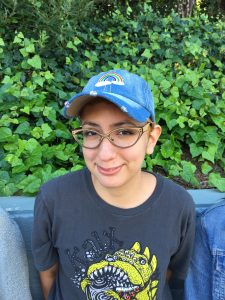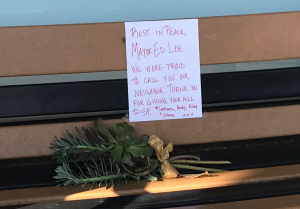How To Report a Breaking News Story: Audio Academy and KALW Report On Ed Lee’s Death
By Ben Trefny, News Director, KALW Public Radio, and Lilia Vega, KALW Audio Academy Fellow
Last week, on Tuesday, 12/12/17, the Bay Area woke up to news that San Francisco Mayor Ed Lee had suddenly died. It was shocking. Sad. And for journalists, it meant we had to step up to share the information and provide context to help our audience understand what happened and what would come next.
I immediately thought about Ed Lee’s legacy. Where had he come from? How had his perspectives evolved? How had the office of mayor and the dramatic economic changes in the Bay Area changed him? I started listening back to interviews I’d conducted with him during his two campaigns for mayor. I found a fascinating clip of him from 2011 (see below)
discussing the need to support a tech corridor anchored by Twitter in the city’s mid-Market neighborhood. And I found an emotional soundbite of him responding to the passage of a higher minimum wage in San Francisco, recorded by KALW‘s Steven Short, that I played for him in a 2015 conversation. At 8:50 that morning, I sat down in KALW’s Studio A to give a rare, live, eight-minute newscast with information about the mayor’s death, talk about his immediate successor, London Breed, and share some of what Lee had championed during his lifetime.
Immediately after, we needed to turn to the day’s Crosscurrents. We wanted to get interviews, record press conferences, gather reactions, and provide a more thorough biography of Lee. I recognized that the supermarket where he’d collapsed was close to KALW — Lee lived in San Francisco’s Sunnyside neighborhood — and it would be interesting to talk with people who live and work in that community. I put a call out to our team, to see if somebody could record conversations. Audio Academy Fellow Lilia Vega stepped up.
After we completed our impromptu, half-hour program at 5pm, I asked Lilia if she would share her thoughts on her breaking news reporting. Here’s what she had to say:
I sort of stumbled into this reporting assignment by accident! I was leading the news conference call the day of Mayor Ed Lee’s passing, and it was all we could talk about for the first few minutes. We were all in shock. I had gone to sleep late the night before — one in the morning, actually — and a few hours later awoke to discover that San Francisco had lost its mayor. I hadn’t even included it in the news digest, because the news hadn’t broken yet. Lee passed away at 1:11 am at San Francisco General Hospital.
On the conference call, I mentioned in passing that I was in a noisy cafe in Glen Park. Christine, my fellow Audio Academy trainee, asked, “Wait — are you in that cafe near Glen Park station? The Safeway where he collapsed is just down the street.”
Did I have my recording equipment with me? No. Did I see the email Ben had sent with suggested interview questions? No, but I’d bring it up on my phone. Did I want to interview some of Mayor Ed Lee’s neighbors? Yes, I’d do it! The Safeway was just down the street; what a great opportunity! How hard could it be?
And so — vibrating with a mixture of excitement, newbie reporter nerves, and twelve ounces of caffeine — I hopped on the #23 bus headed … in the wrong direction. Then I got off the bus, walked a few blocks, got back on the bus, and managed to get to the Safeway on Monterey Boulevard just before 11.
At the Safeway, a makeshift memorial had been set up in Mayor Ed Lee’s honor with a heartfelt message: “Rest in Peace, Mayor Ed Lee. We were proud to call you our neighbor. Thank you for giving your all to SF.” My gut twisted. Lee wasn’t my mayor and I didn’t know him, but a wave of sadness rolled over me all the same. It was a reminder that he was a real person, not just words on a screen. The note was signed by four names, people who probably knew him and had seen him a dozen casual times checking out groceries. Maybe he’d cracked a joke or two with them. As one person I later interviewed noted, the mayor was famously “hysterical.” I couldn’t help but feel a little guilty about asking people who might have known Lee about his death so soon after it had happened. I made a silent promise to myself to be sensitive, to be kind, and to just for the love of god don’t be awkward, please don’t be awkward.
I nervously scanned the parking lot for faces. In my mind echoed the voice of Steven Short, who offered a tip for me just before I got off the call: “Talk to couples. It’s easier to interview people in groups.” I spotted a young couple headed towards the store. Bingo.
Phone in hand, I rushed to meet them. “Hi, I’m LiliaVega, reporter for KALW public radio … we’re asking people in his community about Mayor Ed Lee’s passing. Would you be willing to share your thoughts with me?”
“WHAT?”
Oh. “Do you mind if I get your reaction on tape?” “Sure, oh my god what happened?”
The couple lived nearby, just a few blocks down the road. They hadn’t heard the news yet. Our interview began with me haltingly explaining what happened: Mayor Ed Lee had collapsed in this very Safeway the day before. “Is this a prank?” asked the woman with my phone in her face. “No, no, I’m serious.”
They didn’t know him, but they knew of him. The woman’s mother had lived in Oakland for many years, and was a supporter of Lee’s. The man accompanying her mused about what was next for the city with such a prominent figure like Lee gone. My hand was shaking — whether from nerves, caffeine, or my own physical weakness, I’m not sure. This was my first interview with strangers, and it was, as I had feared, awkward. But, not as awkward as I had expected.
We said goodbye, and I walked toward the next person I saw. Would he care to share his thoughts on Mayor Ed Lee’s passing? “Uh, actually … I’m a reporter for Hoodline.” Woops.
In the parking lot, several news vans had rolled up and were filming. The place was getting congested with reporters, so I snapped a picture of the memorial in front of the store and left, hoping to get more interviews from neighbors.
In my wanderings, I got a few rejections, but also, a few very nice people who gave their thoughts freely. For some, I was breaking the news for the first time, something I hadn’t expected. I tried my best to break the news gently, realizing for the first time the kind of authority you have once you out yourself as a reporter.
One man I interviewed was UPS driver Leo Parker. He knew Lee wasn’t everyone’s favorite person, politically, but to Parker he was “just … the mayor.” And he had always treated him well. And when UPS had its problems, Lee would come down to talk. Had he known Lee personally? “Yes.” And how long had he delivered to Lee? “30 years.” Not for the first time that day, my stomach dropped. Real people had known Lee, and not just politicians. A lot of people would be mourning his passing.
I wandered for an hour or so before I was ready to head back. I listened to the interviews on the bus ride to the station, wincing and cringing every time. Absorbed in my task, I barely noticed when the bus pulled over. Then I caught a few words from the conversation across from me: “… moment of silence … the mayor …” I wrenched my earbuds from my ears. “What, what happened?”
“We pulled over for a moment of silence for the mayor.”
Nerves evaporated, I leapt from my seat and asked the bus driver if I could get an explanation from him on tape. All Muni buses had pulled over at exactly noon for a moment of silence. Everyone on public transportation at noon that day was bound by this collective experience.
The moment I walked into the station, I was greeted by applause. My first “man on the ground” … complete! And although talking to strangers unsolicited had been agonizing, and although I didn’t have the carefree charisma of a more experienced reporter, it wasn’t so bad. And I could do it again, if I wanted to!
I waited until the next day to listen to the interviews as they aired on Crosscurrents. The engineers had ironed out all the kinks, edited out my mispronunciations, smoothed over all the transitions, and even somehow managed to dampen the sound of the jackhammer over one of the interviews. The episode, a tribute to Ed Lee, was informative, sensitive, and honest. And at the end of the episode, the people I had met on the street gave their thoughts on a man who had been their neighbor, though not everyone knew it. I am so, so incredibly grateful that KALW gave me the opportunity to contribute to this story, and to learn on the job while doing it. I’m more excited than ever to continue in my journey as a reporter … and to hear my name in Hana Baba’s beautiful, melodious voice!
From KALW News in San Francisco, I’m Lilia Vega … signing off!


